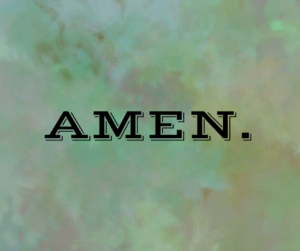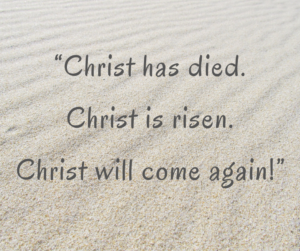(the last in our series exploring our worship service)
 Sending Forth
Sending Forth
The last part of the worship service may seem at first to be a formality. It is by far the shortest part, but it is very important. This is the “sending forth.” It is easy to become distracted at this point, with visions of pot roast dancing in our heads, but this part of the service is still an act of worship like the rest.
Remember in previous articles we have discussed how the congregation gathers out of our separate lives for the purpose of worship. We have talked about coming together purposefully to bring praise and honor to God, to hear and be changed by His Word and to respond to it in Communion or in an alternate time of thanksgiving. Now it is time to leave, but this leaving is not just a mass scuttling for the door--it is a purposeful act of worship.
Shine Like Lights
 When we come together we are the “Church actualized,” the Church celebrating who we are in the midst of a sinful age, celebrating the fact that we belong to the Kingdom which is to come. When we separate, we become the “Church scattered.” We go back into all of our homes and workplaces and schools and social circles, the places where God means for us to “shine like lights in a crooked and perverse generation.” The sending forth part of a worship service is a purposeful transition between these roles.
When we come together we are the “Church actualized,” the Church celebrating who we are in the midst of a sinful age, celebrating the fact that we belong to the Kingdom which is to come. When we separate, we become the “Church scattered.” We go back into all of our homes and workplaces and schools and social circles, the places where God means for us to “shine like lights in a crooked and perverse generation.” The sending forth part of a worship service is a purposeful transition between these roles.
The last act of this final part of the service is a Benediction or sometimes a Doxology. In a church where a procession/recession is used, this may come before the hymn of dismissal. These are two slightly different prayers, although they both are usually referred to as “the Benediction.” A Benediction is a blessing such as “The Lord bless thee and keep thee: the Lord make His face shine upon thee and be gracious unto thee: the Lord lift up His countenance upon thee, and give thee peace. Amen.”
Addressed to YOU
If yo u listen closely, you will hear that this is addressed to you, the congregation, not to God. It is actually appropriate to look at the pastor as he pronounces the blessing over you. The congregation should always join in on the final Amen. The word “amen” means “so be it.” Since the earliest days of the Church, the congregation says amen to agree with what has been said. We certainly want to agree with this kind of blessing!
u listen closely, you will hear that this is addressed to you, the congregation, not to God. It is actually appropriate to look at the pastor as he pronounces the blessing over you. The congregation should always join in on the final Amen. The word “amen” means “so be it.” Since the earliest days of the Church, the congregation says amen to agree with what has been said. We certainly want to agree with this kind of blessing!
Give Him all the Honor
A Doxology is a Scriptural hymn of praise to God. You can recognize one of these because it often begins with the words “now unto Him.” Some of these prayers seem to be speaking to God and to us at the same time. Consider my favorite one: “Now unto Him who is able to keep you from falling, and to present you faultless before the presence of His glory with exceeding joy, to the only wise God our Savior, be glory and majesty, dominion and power, both now and forever, Amen.” This prayer kind of speaks to each of us by reminding us of what God has promised to do for us, and then it forces our gaze upward to give Him all the honor He is due as we go. And again the congregation should join in a ringing “Amen!” at the end.
When I was growing up my dad used this particular prayer a lot. I misunderstood what he was saying and thought it was “and now on the hymn that is able to keep you from falling...” Because this prayer invariably followed the final hymn, I thought it referred to it. In my mind that was one powerful song! I’d be embarrassed to tell you how old I was when I realized what was really being said!
We do not go alone
 Whether it is a Benediction or a Doxology, the final prayer is to strengthen us and to remind us that we do not go alone into the world, that God is with us, that He is in control and that we are His people.
Whether it is a Benediction or a Doxology, the final prayer is to strengthen us and to remind us that we do not go alone into the world, that God is with us, that He is in control and that we are His people.
The Benediction or Doxology is typically followed by a song or hymn of dismissal or sending forth. If you look at these closely, you will hopefully see that the words to this song encourage us to go and be God’s people. Sometimes the song will say just that, such as when we sing Graham Kendrick’s “Go Forth.” Other times it will tie in specifically to the sermon we have heard. Sometimes it might be a song of commitment such as “Take My Life And Let It Be.” Hopefully it will always encourage us to remember that the Life of Christ is to be lived out in our lives as we go. In some congregations which have a procession, everyone symbolically follows the cross out into the world.
After the Song of Dismissal, we join together to proclaim our hope:
In our worship service we celebrate the fact that we are the presence of the future in the world today. God created us, we fell into sin, He sent Jesus to live and die and rise again on our behalf. Jesus is now at the right hand of God interceding for us. Someday He will come again and end all injustice, sin, hatred and war. As the Redeemed, we are testimony to the fact that God is re-creating the world. He has already begun with us! Now we are sent forth to work for kingdom come. We don’t meander through life. We are people of destiny, children of the most high God, and we have a mission to fulfill. The great commission says, “as you are going, make disciples of all nations.”
Our awesome privilege
Our final act of worship is this: The pastor says, “Go now, to love and serve the Lord!” and the congregation responds, “Thanks be to God! Alleluia! Alleluia! Alleluia!” This is an absolutely appropriate response to the awesome privilege of going out to serve the king. This puts our world into perspective. Our first allegiance is not to our bosses, our companies, our families or our country. Our first allegiance is to the King of kings and Lord of lords. We go forth to do His work and to proclaim the coming of His kingdom.
“And now the God of peace that brought again from the dead our Lord Jesus, that great shepherd of the sheep, through the blood of the everlasting covenant, make you perfect in every good work to do His will, working in you that which is well pleasing in His sight, through Jesus Christ, to whom be glory forever and ever. Amen!”
